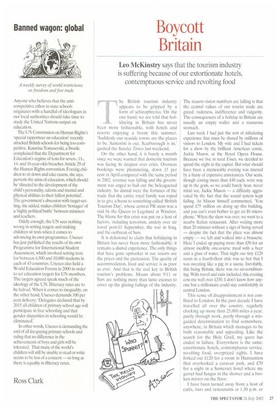Banned wagon: global
A weekly sutvey of world restrictions on freedom and free trade
Anyone who believes that the anticompetitive ethos in state schools originates with a handful of ideologues in our local authorities should take time to study the United Nations output on education.
The UN Commission on Human Rights's 'special rapporteur on education' recently attacked British schools for being too competitive. 'Catarina Tomasevski, a Swede, complained that the Department for Education's regime of tests for seven-, 11-, 14and 16-year-olds breaches Article 29 of the Human Rights convention. Forcing children to sit down and take exams, she says, perverts the aims of education, which should he 'directed to the development of the child's personality, talents and mental and physical abilities to their fullest potential'. The government's obsession with target-setting, she added, makes children 'hostages' of a 'highly political battle' between ministers and teachers.
Oddly enough, the UN sees nothing wrong in setting targets and making children sit tests when it comes to advancing its own programmes. Unesco has just published the results of its own Programme for International Student Assessment, which involved setting tests for between 4,500 and 10.000 students in each of 43 countries. Unesco also held a World Education Forum in 2000 in order to set education targets for UN members. The targets agreed speak much of the ideology of the UN. Illiteracy rates are to be halved. When it comes to inequality, on the other hand, Unesco demands 100 per cent delivery: 'Delegates declared that by 2015 all children of primary-school age will participate in free schooling and that gender disparities in schooling would be In other words, Unesco is demanding the end of all fee-paying primary schools and ruling that no difference in the achievements of boys and girls will be tolerated. That many of the world's children will still be unable to read or write seems to be less of a concern — so long as there is equality in illiteracy rates.


























































 Previous page
Previous page